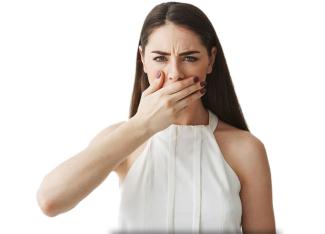
Bad breath, also known as halitosis, can be caused by a variety of factors. To get rid of bad breath, it's important to address the underlying cause. Here are some steps you can take to combat bad breath:
- Good Oral Hygiene:
- Brush your teeth: Brush your teeth at least twice a day, preferably after meals. Use fluoride toothpaste and be thorough in your brushing, including your tongue.
- Floss daily: Flossing helps remove food particles and plaque from between your teeth and along the gumline.
- Use a tongue scraper: Gently scrape your tongue to remove the bacteria that can contribute to bad breath.
- Stay Hydrated:
- A dry mouth can contribute to bad breath. Drink plenty of water throughout the day to keep your mouth moist.
- Avoid Tobacco and Alcohol:
- Smoking and alcohol can contribute to bad breath. Consider quitting smoking and limiting alcohol consumption.
- Watch Your Diet:
- Certain foods can lead to bad breath. Avoid strong-smelling foods like garlic and onions. Instead, opt for foods that promote fresh breath, like fruits and vegetables.
- Sugar-free gum and mints can help temporarily mask bad breath.
- Visit the Dentist:
- Regular dental check-ups can help identify and treat any oral health issues that may be causing bad breath, such as gum disease, cavities, or dental infections.
- Manage Underlying Medical Conditions:
- Some medical conditions like diabetes, respiratory infections, and gastrointestinal issues can contribute to bad breath. Consult your healthcare provider if you suspect an underlying medical cause.
- Use Mouthwash:
- Use an antimicrobial or antibacterial mouthwash as directed by your dentist to help kill bacteria and improve breath.
- Humidify the Air:
- In dry environments, consider using a humidifier to prevent dry mouth, especially at night.
- Maintain a Healthy Lifestyle:
- Regular exercise, a balanced diet, and managing stress can all contribute to better overall health, which can positively affect your breath.
If you've tried these strategies and still have persistent bad breath, it's important to consult with a dentist or healthcare provider to rule out any underlying medical conditions or receive professional guidance on addressing your specific case of bad breath. They may be able to provide more targeted treatment options or recommend specialty products to help with your particular situation.






